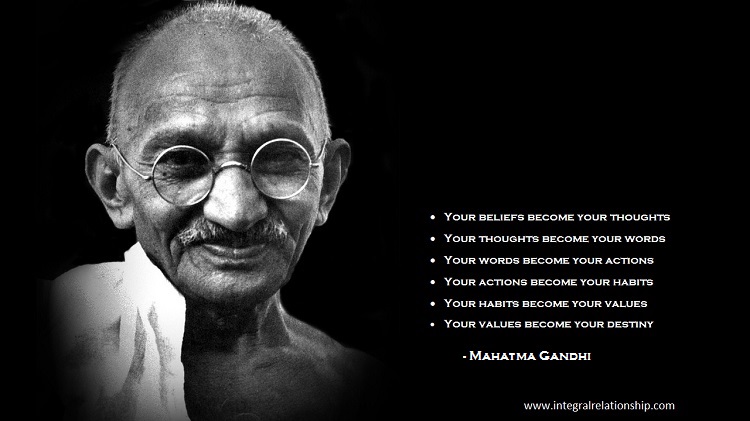According to social philosopher Jürgen Habermas*, all human actions (which Gandhi says become our habits, values and destiny), are always primarily coordinated by speech or language use. Whenever humans use language to coordinate their love relationships, they enter into certain commitments to justify their words and actions on the basis of their thoughts and beliefs.
Habermas calls these commitments that justify our words and actions “validity claims”. He argues that any sincere speech-act makes three different validity claims:
- A validity claim to objective truth.
What can be proven outside an individuals subjective feelings, thoughts, imaginings, ideas or interpretations. - A validity claim to ethical or moral rightness.
Ethical refers to what is good/bad for me, us, and all of us, and is based on relative and conditional values. Moral is what is right/wrong and caring/uncaring, based on norms of what is just/unjust, responsible/irresponsible, and absolute/unconditional (see Kohlberg’s stages of moral development that are interwoven below.) - A validity claim to subjective truthfulness.
Do the speakers really mean what they say or are they lying to themselves or others. The four questions and turnarounds from Byron Katie’s “the work” come to mind. (1) Is it true? (2) Can I absolutely know that this is true? (3) How do I react, what happens, when I believe that thought/feeling? (4) Who would I be without the thought/feeling?
Spiritual development through meditation and shadow work are essential for developing increasing capacities for truthfulness.
We can only make ourselves understood, and engage in meaningful conversations with our partner and others (e.g. friends or a therapist/coach) if we presuppose and believe that all participants are truthful and say what is both right and true.
As we know from Ken Wilber’s Integral Model, beliefs, including those about love relationships, that underlie our validity claims change as we grow in consciousness. Understanding validity claims at different levels of consciousness and how we deal with conflicts is therefore vital for co-creating healthy sustainable love relationships.
At the magical level we believe in love relationships as we know them from fairy tails and Disney movies. The purpose of love is to be enchanted and to live happily ever after with “The One”.
There is little to no capacity for understanding or accepting objective truths; morality is understood in terms of punishment and obedience, and the avoidance of harm to self and others; truthfulness is limited to expressing simple feelings such as “I am sad, scared, happy etc.” The answer to questions is often “because”.
Conflicts are resolved by walking away or giving in.
At the egocentric level we believe that love (and sex) is something that we are entitled to and can demand (see The Rules orThe Game). The purpose of a love relationships is to get all our needs met by our partner.
Objective truth is whatever we believe to be true without giving evidence, and those who disagree are wrong and deserve to be shamed and punished; morality is understood as a way of satisfying one’s own interests and letting others do the same; truthfulness is based in “that’s the way I think and feel and it is the only way to feel and think about this situation … period.”
Conflicts are solved by arguing and fighting, and whoever gives up first was wrong and loses (winning the argument, losing the relationship).
At the mythic/conformist level we believe that love is an action and duty (see Men are from Mars, Women are from Venus). The purpose of love relationships is to create stable families and communities to raise children in.
Objective truth is derived from a higher authority (he/she/they say so) and can’t be questioned; morality is understood as being good by following rules, meeting expectations, and showing concern for others; truthfulness is associated with being honest (though shalt not lie) and to say what is considerate, honorable, caring and kind (love thy neighbor as you love yourself).
Conflicts are resolved by referring and submitting to the higher authority, e.g. the man/father, commander, superior, law or scripture.
At the rational level we believe that feelings of love are generated by hormones through sexual and intellectual chemistry (shared values, interests, lifestyles and goals) and when we act romantically towards each other (see Why we Love or Falling In Love). The purpose of love relationships is for partners to support each other in realizing their highest dreams for optimal health, wealth, success and happiness through education and psychological strategies.
Objective truth is derived from empirical scientific evidence that is acquired by means of observation or experimentation; morality means fulfilling one’s duties, maintaining the social order, and the welfare of the society or group that one is part of; truthfulness is based in calculating the risks and benefits of revealing thoughts and feelings based on one’s goals and objectives.
Conflicts are resolved by separating people from the problem, focusing on interests and not positions, being soft on the people and hard on the problem, inventing options for mutual gain/win-win, using objective criteria and not feelings, focusing on the solution and not the problem, and positive thinking.
At the pluralistic level we believe that love is unconditional and a path to higher consciousness and spiritual realization when we are with our soul-mate, celibate or with multiple lovers, depending on the state that we are in (see Love and Awakening orThe Future of Love). The purpose of love is to heal and to awaken in order to experience an ever deeper sexual, emotional and spiritual connection.
Objective truth does not exist and everything is relative and constructed by the presence, perspective and interpretation of the observer; morality is conceived as the basic rights, values and legal contracts of a group or society and based in universal laws, even when they conflict with the concrete rules and laws of a higher authority or majority opinion; truthfulness is to authentically express our thoughts, feelings and needs as well as our perception of others as long as it is loving, kind and necessary.
Conflicts are resolved through non-violent/compassionate communication, in which observations, feelings, needs and requests are expressed, and empathy is shown by guessing others feelings, needs and desires.
At the integral level we believe that love includes all the healthy aspects of the previous levels and serves an evolutionary purpose (see Integral Relationship, A Manual for Men). The purpose of love relationships is to heal, learn and grow to serve an authentic evolutionary purpose that is greater than either individual and provides the highest good for the largest number of people by balancing feminine and masculine polarities in all four quadrants (“I”, “We”, “It” and “Its”) at the level of all the seven chakras.
objective truth depends on validity claims (see above), different verification methods, and different experiences that are all actually reconcilable, mutually enriching, and already all present in a world spacious enough to house them all (Wilber); morality is based on the validity of underlying universal principles of equality, justice, care and dignity for all human beings into which any rational person has an insight to; truthfulness is based in the inter-subjective we-space with an awareness of various forms of the unconscious (we can’t know what we don’t know about) including shadow and the subject/object split.
Conflicts are resolved by understanding that everybody is right from their own perspective, considering developmental lines in all the four quadrants (objective, subjective, individual and collective) and focusing on competencies, functionality, flexibility, creativity and flow.
I am curious about your thoughts and experiences around this topic? Please send an email to[email protected] or post at www.facebook.com/integralrelationship.

